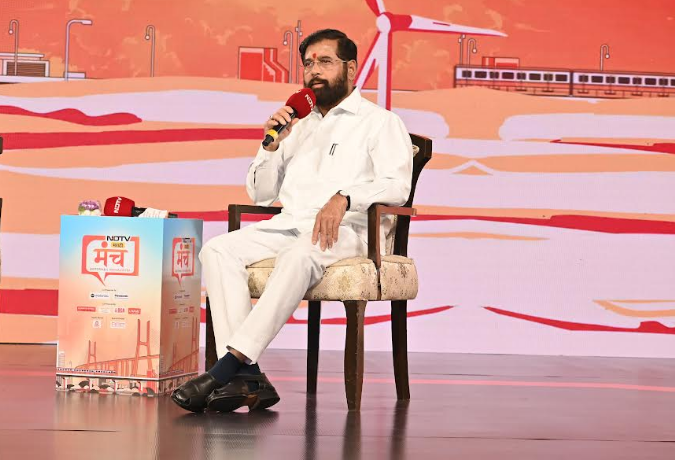28th April, 2025 – As NDTV Marathi celebrates its first year, it hosted a flagship event—NDTV Marathi Manch—bringing together political leaders, policymakers, entrepreneurs, and experts to review Maharashtra’s development trajectory and collectively envision its future. The event served as a dynamic platform for dialogue on governance, infrastructure, public health, environmental challenges, entrepreneurship, and national security.
Mahayuti leaders committed to a farm loan waiver ahead of the elections, leading to ongoing questions directed at the government over its implementation. Speaking on the matter, Chief Minister Devendra Fadnavis said, “60-70 per cent of farmers in the state are under financial stress. We help farmers in the state with Rs 12,000 annually. We help them through insurance in various ways. If we consider all these things, we are helping farmers”.
As part of the program – ‘Nava Gadi, Navam Rajya’, Maharashtra’s newly appointed ministers, including Public Works Minister Shivendraraje Bhosale, Public Health and Family Welfare Minister Prakash Abitkar, and Minister of State Meghna Bordikar, shared insights into their respective departments and addressed current challenges.

One of the standout sessions featured an engaging conversation with acclaimed filmmaker Om Raut and veteran actress Pallavi Joshi. Known for his cinematic successes such as Tanhaji: The Unsung Warrior and Adipurush, Raut offered a behind-the-scenes look into his creative journey and his perspectives on Indian cinema. Joshi, whose illustrious career spans decades with roles in Woh Chokri and the recent The Kashmir Files, brought a rich actor’s perspective to the discussion.
In another thought-provoking session, NDTV Marathi Manch welcomed a panel of popular Marathi digital creators: Rohit Mavle, Siddhesh Lokare, Saurabh Bhosale, and Ganesh Vanare. These influencers shared their personal journeys—marked by perseverance, creativity, and community engagement. They emphasized how their content serves not just to entertain, but to preserve and promote the cultural richness of Maharashtra, from traditional foods to local festivals and values. Their presence highlighted the powerful role of digital media in shaping cultural identity and inspiring the next generation.
The conclave also shed light on Mumbai’s ongoing transformation, with insights from BMC Commissioner Bhushan Gagrani and Mumbai Metro Rail Corporation MD Ashwini Bhide. Commissioner Gagrani outlined the BMC’s continued efforts in providing vital civic services—from water and healthcare to transportation—ensuring Mumbai remains functional and resilient. Bhide shared a significant update on the city’s mobility landscape, announcing that Phase 2 of the expansive Metro-3 project is likely to commence in May 2025, marking a crucial step toward improving urban connectivity.
Minister Shivendraraje Bhosale addressed speculation surrounding Deputy Chief Minister Eknath Shinde’s visits to his native village in Satara, saying, “It is incorrect to say that Mr. Shinde is displeased whenever he visits Daregaon. These are narratives built on screen. We meet him regularly, and he warmly receives us. If he were truly upset, such meetings wouldn’t occur. Visiting one’s village should not be seen in a negative light.” Additionally, Minister Meghna Bordikar echoed this sentiment, stating, “I have never observed any signs of discord. Discussions about tensions between Chief Minister Devendra Fadnavis and Deputy Chief Minister Eknath Shinde are purely media-driven.”
Union Minister Nitin Gadkari addressed the economic development and emphasised the critical role of infrastructure, which contributes 22–24% to the GDP. “Maharashtra leads in infrastructure, services, and agriculture. We must continue building on this momentum,” he stated.
Health Minister Prakash Abitkar also announced a major initiative in the public health sector, highlighting the lack of regulation in diagnostic testing laboratories across the state. “Until now, there’s been no formal monitoring mechanism for these labs. We are drafting legislation to inspect and regulate their functioning. Irregularities will not be tolerated,” he said. The law is expected to be tabled in the upcoming legislative session.
The event also turned its attention to national security in light of the recent terrorist attack on Hindus in Pahalgam, Jammu and Kashmir, resulting in over 26 fatalities. RSS leader Prabhakar Sunil Ambekar condemned the attack, stating, “This was an attempt to disrupt the peace and development of the region. The culprits must face severe consequences to ensure such acts are never repeated.”
On environmental issues, MPCB Chairman Siddhesh Kadam provided updates on the steps being taken to combat urban pollution, a growing concern across Maharashtra’s metro cities. In the business and innovation segment titled ‘Let’s Startup Maharashtra’, industry leaders such as Indranil Chitale (Chitale Industries), Vilas Shinde (Sahyadri Farms), and Vidyadhar Anaskar (MSC Bank) delved into the opportunities and challenges facing startups in the state.
Fisheries and Port Development Minister Nitesh Rane presented the transformative potential of the Vadhan Port, asserting that the project would generate over 1 lakh direct and 25,000 indirect jobs, significantly boosting Maharashtra’s maritime economy.
On the infrastructure front, Charudatta Deshmukh, Planning and Design Head of Navi Mumbai International Airport, announced that the airport’s first phase will be inaugurated in August. He underscored its global benchmark-setting design and capabilities. The event also featured inspiring stories of emerging career paths. Girish Kamble, CEO of Vayudoot Education Pvt. Ltd., offered guidance on becoming a commercial pilot, while Rajendra Chodankar, Chairman of RRP Electronics, highlighted India’s growing potential in the semiconductor sector.

